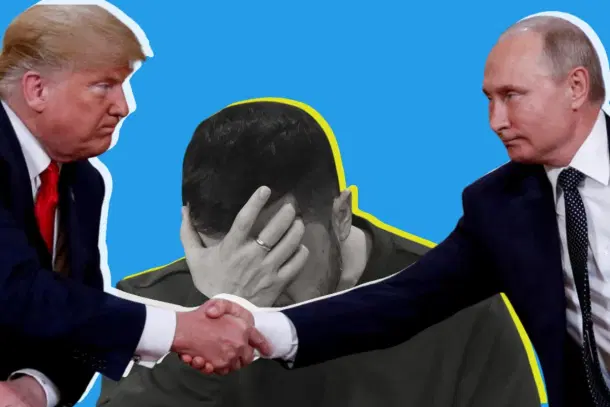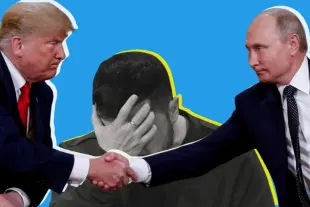World
A Turn Towards Common Sense Reveals The Road To Peace In Ukraine
Venu Gopal Narayanan
Feb 15, 2025, 08:23 AM | Updated Mar 03, 2025, 04:26 PM IST
Save & read from anywhere!
Bookmark stories for easy access on any device or the Swarajya app.


For three miserable years, global trade and peace was shaken by a truly senseless American proxy war against Russia in Ukraine. What should have been a recovery year from the pandemic became one filled with economic woes, ironically most, for its instigators – America under President Joe Biden, and his supporters in Europe.
But look at how swiftly things have changed, especially in the past week, after Donald Trump was sworn in as America’s new president in January 2025. Finally, peace is at hand.
Prime Minister Narendra Modi met French President Emannuel Macron in Paris for a series of key discussions. Trump sent his deputy JD Vance to Paris to meet both Modi and Macron. The next day, Trump had an extended telephonic conversation with his Russian counterpart, President Vladimir Putin, in which, they discussed broad frames of reference under which peace negotiations might begin. And hours later, Modi left for America to meet Trump.
Left entirely out of the loop were Europe, Ukraine, and China. That is a sea change from the myopia, distrust, and carnage which the world had to suffer under Biden for four years too many. It is, therefore, important that we analyse this shift carefully.
First, the Trump administration has formally accepted that Ukraine will not become a member of the North Atlantic Treaty Organization (NATO). This was the precise point on which Putin was forced to go into Ukraine in 2022, as a culmination of sustained American efforts under Barack Obama and Biden to expand NATO into Russia’s core security sphere.
Second, America admits that a new map of Ukraine will most probably not include the Russian-speaking areas of the Donbass and Crimea. Which means that these areas will be incorporated into the Russian republic in due course of time.
The corollary to this point is that it underscores the true senselessness of the Russia-Ukraine conflict, and, that the blood of those who were killed and injured in this war lies squarely on the hands of the Biden administration, its NATO allies who actively participated in the devastation, and their puppets like Ukrainian president Volodymyr Zelensky, who tamely did as ordered, without a care for the horrific consequences to their own land.
Third, the proposed peace talks offer Trump an opportunity to wean Russia back from the firm embrace of the East, particularly China, with whom Russia now enjoys a near-umbilical trade relationship.
Fourth, bypassing NATO to deal directly with Russia means, for all practical purposes, that Trump has thrown Europe under the bus – in security terms, that is. Similarly, he has also thrown Zelensky under the same bus. This was inevitable at multiple levels, and was predicted independently in 2022 by both this writer and Swarajya columnist Jai Menon.
To explain: Zelensky, the proxy war, its support, and its prosecution, both on the ground and in the media, were a creation of the American ‘deep state’ and its cohorts in Europe. (We use the phrase ‘deep state’ here to mean that powerful section of the permanent executive, political class, business, and media, in the West, colloquially also called neocons, which design and execute policies to ensure Western dominance over global affairs through colour revolutions, sustained instability, and conflict in target regions)
Trump has to get rid of this deep state if he is to function efficiently, recover America’s primacy as a force for global good, and change its present image of an unreliable ally and a nuisance, forever instigating trouble in distant lands.
It is the mother of all resets in foreign affairs, a comprehensive rejection of a notorious ‘neocon’ foreign policy America adopted at the end of the Cold War, and a tack which Trump tried to pursue in his first term, but failed, because of the pandemic, and then his own loss in the dubious 2020 presidential elections.
To press the point home, Vice President Vance publicly snubbed German Chancellor Olaf Scholz in Munich, Germany, this week by refusing to meet Scholz and saying, “We don’t need to see him, he won’t be Chancellor long”. Instead, he met Frederich Merz, the man touted to replace Scholz. Such a stinging move, on German soil, is a powerful message to not just Germany or Europe, but to the world: that, beyond a point, old ties won’t mean a damn if they conflict with America’s best interests.
The pushback from the deep state was immediate, of course, with Kaja Kallas, Vice President of the European Commission, issuing a strong statement on behalf of the Weimar+ Group, saying they were ready to enhance support for Ukraine, that Europe had to be party to peace talks, and, extremely provocatively, that Ukraine’s territorial integrity was non-negotiable. Imagine that – such a statement precisely at a time when Trump and Putin are planning peace talks in accordance with Russia’s fundamental positions.
But this will cut no ice in the diplomatic world, even if the Weimar+ Group, on paper, consists of France, Germany, Poland, Italy, Spain, and Britain, because the European Commission is a toothless body in this respect, and does not represent the strategic aims of sovereign member nations.
Italian Prime Minister Meloni has not followed the Biden line since she was elected. Macron of France will never forgive Biden for triggering economic chaos in Europe, as a result of which Macron’s party was trounced in French parliamentary elections last year. Spain surged to the right last year, and the British Conservative Party, by far the most active supporters of Biden’s Ukraine policy, were wiped out by the Labour Party in the last general elections.
Consequently, fifth, the dissonance within the west, combined with Trump’s plans to repair the many bilateral ties wrecked under the Biden administration, means that the deep state is now looking into an existential void.
Naturally, he has a lot of work to do before damage control can be instituted satisfactorily, and it will certainly not be easy since the deep state will not go quietly into the night, but Trump will have the upper hand because of two reasons: his party’s tight control of both the Congress and the Senate, and, the support of world leaders who, too, seek an end to an era of senseless wars.
This is a good climate for India to operate in at the world stage. Biden never forgave India for making his sanctions on Russia a non-starter, and tried to hurt us by delaying the critical supply of engines for the Tejas fighter jets, as well as by trying to muddy our domestic political pools.
But today, if Trump seeks to reduce the trade surplus India presently enjoys vis-à-vis America, he can do that only by selling even more engines to India, along with more gas. It is not exactly a cleft-stick situation, but more an opportunity for America which India will seek to benefit from.
Besides, the more Trump cleans up the deep state, the less of a nuisance it is for India. Look at how swiftly he dismantled USAID, one of the key agencies designed to foment trouble internationally. So, if the Khan Market gang are going to have their rice bowls broken soon, that’s not such a bad thing now, is it?
Thus, in conclusion, we see that the new Trump administration aspires to engage in a constructive manner with important nations like Russia, France, India, and Saudi Arabia, in order to end regional conflicts and promote global trade.
How nations like China, Pakistan, Iran, and Britain fit into this scheme of things, and how they respond or react, will be something to watch out for.
After all, if viewed objectively, Yemen, Ukraine or Gaza are tiny local conflicts when compared to the one that actually looms: India’s concerns with the China-Pakistan nexus right on our border. The threat is real, and the Americans know that this sits well above any trade woes Trump may wish to address. The beginning of the end of a long colonial era is finally at hand, and it will be messy.
Venu Gopal Narayanan is an independent upstream petroleum consultant who focuses on energy, geopolitics, current affairs and electoral arithmetic. He tweets at @ideorogue.





